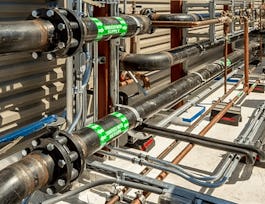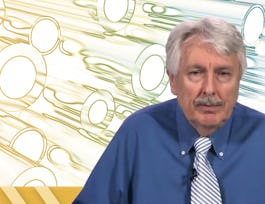Fluid power has the highest power density of all conventional power-transmission technologies. Learn the benefits and limitations of fluid power, how to analyze fluid power components and circuits, and how to design and simulate fluid power circuits for applications.


Fundamentals of Fluid Power
Taught in English
Some content may not be translated
50,768 already enrolled
(1,253 reviews)
Skills you'll gain
Details to know

Add to your LinkedIn profile
5 quizzes
See how employees at top companies are mastering in-demand skills


Earn a career certificate
Add this credential to your LinkedIn profile, resume, or CV
Share it on social media and in your performance review

There are 6 modules in this course
This week: An overview of the course, introduction to hydraulics and pneumatics, and introduction to fundamental concepts of fluid power through the cylinder.
What's included
9 videos10 readings1 quiz3 discussion prompts
This week: circuit diagrams, the written language of fluid power, and how fluid flows through conduits. We hope that you find the hydraulic circuits on the mowing machine as interesting as we did.
What's included
5 videos7 readings1 quiz4 discussion prompts
This will be a busy week diving into valves and pumps. We will discuss how basic valves function, how to use them in hydraulic circuits, and how to calculate pressure drop for a given flow rate, or vice versa. The videos will directly address the discussion on the forum about seeing hydraulic components working in real world circuits. In our discussion of pumps we will look at many different positive displacement pumps, exploring flow ripple and pump efficiency, look at the supporting components that form a hydraulic power supply, and see how we can make a transmission with a hydraulic pump and a motor. We are now into the heart of this course; we hope you enjoy seeing the components come together into useful circuits.
What's included
9 videos10 readings1 quiz3 discussion prompts
This week is entirely devoted to you learning how to use Simscape Fluids (formerly SimHydraulics), the fluid power simulation application that we use in the course. The lecture provides an introduction to computer-based, object-oriented simulation, and goes through a demo of using Simscape Fluids. The homework assignment contains the real work because this is where you will learn to use Simscape Fluids. The homework ends with an open-ended problem that encourages you to branch out on your own and create and run simulations based on examples listed in the course Simscape Fluids resource page or on any other fluid power system that interests you. We will be monitoring the discussion boards to help you with any technical problems with Simscape Fluids. *NOTE: The lecture videos were created using an earlier version of SimHydraulics; some small difference exist with the most recent version of Simscape Fluids, but the general approach is the same. *THERE IS NO QUIZ THIS WEEK as we recognize that a few of you may not be able to get Simscape Fluids running on your computer. Happy simulating!
What's included
1 video6 readings2 discussion prompts
This week we will take a dive into hydraulic fluids (no pun intended) and how their properties and behavior influence the circuit operation. In the lectures, you will see the water hammer effect and explore the assumption of fluid incompressibility. We encourage you to use your new knowledge of fluid behavior and simulation to create virtual experiments that explore how fluid properties influence the behavior of a circuit. Share your observations on the discussion forum.
What's included
3 videos4 readings1 quiz3 discussion prompts
This week you will learn about two new components, the accumulator, which stores hydraulic energy, and the servo valve, which provides fast and precise flow control. We will then be pulling together topics from throughout the course to look at servo hydraulic systems and hydraulic hybrid vehicles. You will get a chance to use simulation to explore how these advanced systems function and how the behavior of individual components influences the system operation.
What's included
8 videos11 readings1 quiz3 discussion prompts
Instructors


Offered by
Recommended if you're interested in Mechanical Engineering

Yale University

L&T EduTech

Georgia Institute of Technology
Why people choose Coursera for their career




Learner reviews
Showing 3 of 1253
1,253 reviews
- 5 stars
81.80%
- 4 stars
16.44%
- 3 stars
1.19%
- 2 stars
0.31%
- 1 star
0.23%

Open new doors with Coursera Plus
Unlimited access to 7,000+ world-class courses, hands-on projects, and job-ready certificate programs - all included in your subscription
Advance your career with an online degree
Earn a degree from world-class universities - 100% online
Join over 3,400 global companies that choose Coursera for Business
Upskill your employees to excel in the digital economy
Frequently asked questions
Access to lectures and assignments depends on your type of enrollment. If you take a course in audit mode, you will be able to see most course materials for free. To access graded assignments and to earn a Certificate, you will need to purchase the Certificate experience, during or after your audit. If you don't see the audit option:
The course may not offer an audit option. You can try a Free Trial instead, or apply for Financial Aid.
The course may offer 'Full Course, No Certificate' instead. This option lets you see all course materials, submit required assessments, and get a final grade. This also means that you will not be able to purchase a Certificate experience.
When you purchase a Certificate you get access to all course materials, including graded assignments. Upon completing the course, your electronic Certificate will be added to your Accomplishments page - from there, you can print your Certificate or add it to your LinkedIn profile. If you only want to read and view the course content, you can audit the course for free.
You will be eligible for a full refund until two weeks after your payment date, or (for courses that have just launched) until two weeks after the first session of the course begins, whichever is later. You cannot receive a refund once you’ve earned a Course Certificate, even if you complete the course within the two-week refund period. See our full refund policy.



